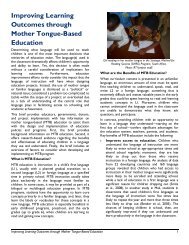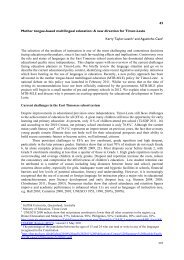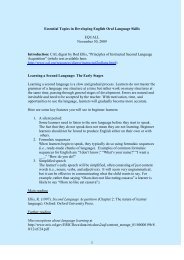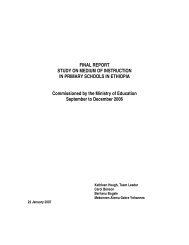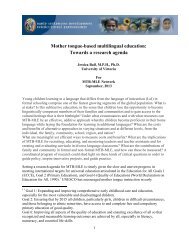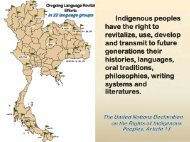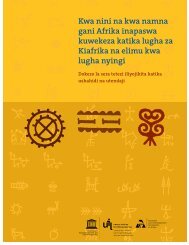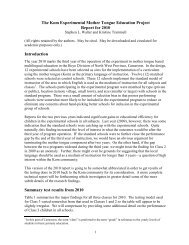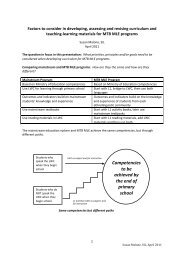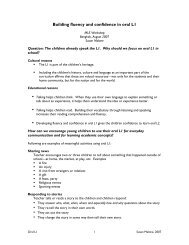Part I.pdf - MTB-MLE Network
Part I.pdf - MTB-MLE Network
Part I.pdf - MTB-MLE Network
Create successful ePaper yourself
Turn your PDF publications into a flip-book with our unique Google optimized e-Paper software.
The Role of Language in Learning:What Does International Research Say?By Kimmo Kosonen, Ph.D.SIL International and Payap University, Chiang Mai, ThailandLanguage and LearningLanguage plays an important role in learning. Anyone who has attempted any educational activityin a language other than her/his own knows this from personal experience. Since language is themain way of communicating meaning in most learning activities, without a sufficient understandingof the instructional language, learning is inferior to that of learners who are fully proficient in thelanguage.This article will discuss the role that language plays in learning. The focus will be on researchfindings that justify the use of the learner’s mother tongue as the most beneficial medium of education.Research on learning a second language by minority students will also be briefly introduced. 1Most research on bilingual education that shows the benefits of using the mother tongue comesfrom developed countries in Europe and North America. A brief summary of these research findingswill be presented later in this article.Among countries in the Asia-Pacific region, a wealth of research on bilingual education has beenconducted in China. These studies provide support and justification for the use of the mother tongueas the medium of instruction in order to achieve bilingualism in a minority language and Mandarin.On the basis of their research, Chinese scholars suggest that a major reason for minority children’spoor educational performance is that learners’ mother tongues have not been used in schools. Further,the mother tongue is considered to be the best medium for early learning, and essential for thedevelopment of minority students’ intellectual ability (Blachford 1997; Lin 1997). Thus, “bilingualeducation is seen as the most feasible policy and effective practice to solve minority language andeducation problems, and to maintain a balance between the national unity and minority aspirations”(Blachford 1997, 159).There are also some credible comparative studies, such as CAL (2001) and Dutcher & Tucker (1996)that discuss these issues on the basis of a number of developing countries. Likewise, UNESCOhas provided well-grounded evidence for the use of learners’ mother tongues in education in twoseminal reports (UNESCO 1953, 2003b). Conclusions from one comprehensive study on languagein-educationissues in the Asia-Pacific region are quite straightforward:1For definitions of the terminology used here, please refer to Appendix 1 at the end of the next article ‘Education in LocalLanguages: Policy and Practice in Southeast Asia.’87





